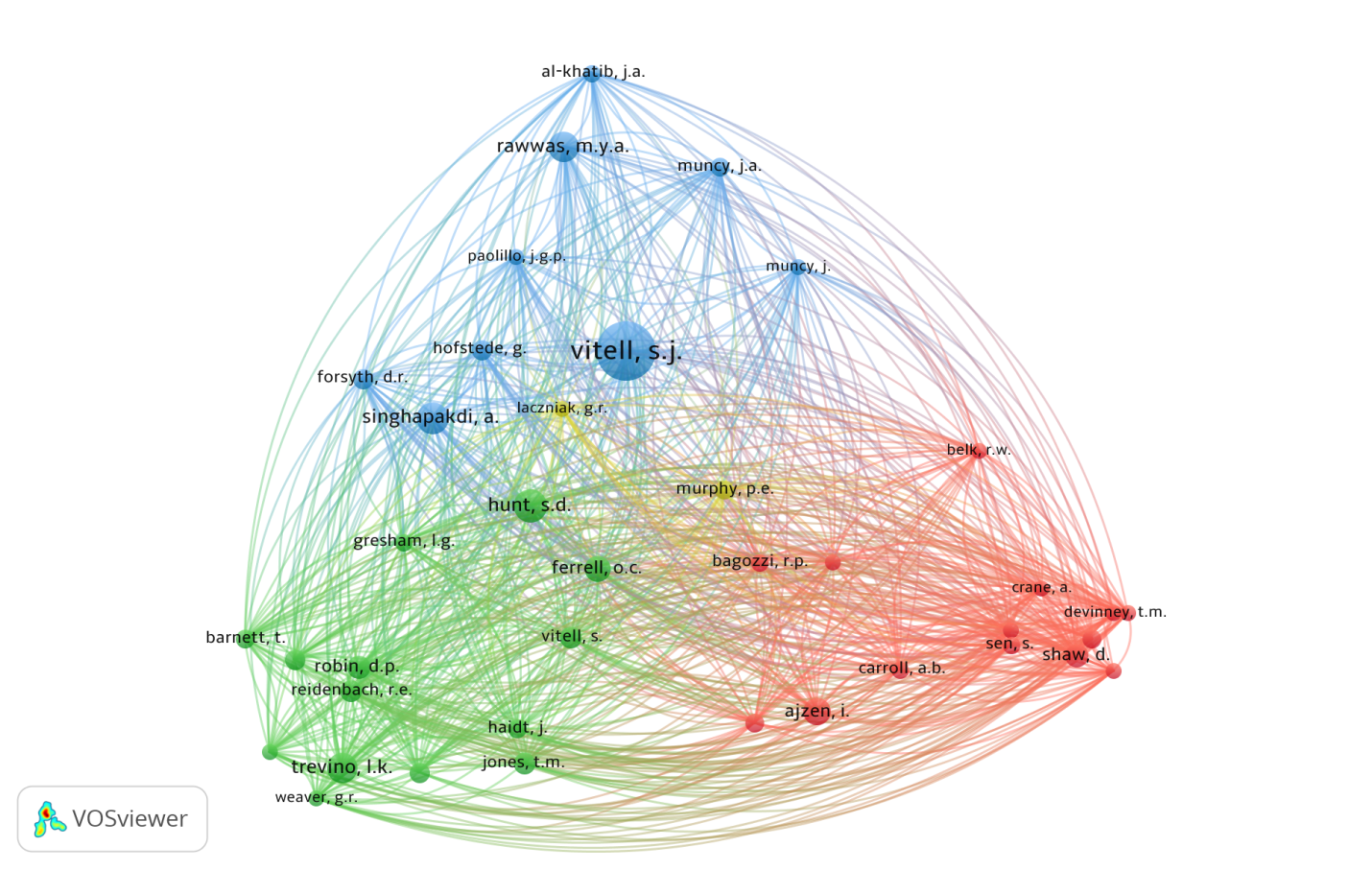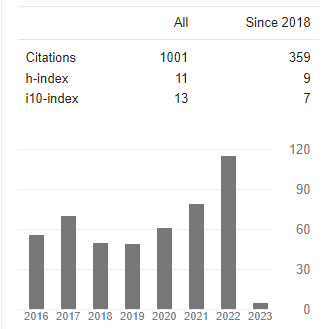Bibliometric Review of Consumer Ethics: Synthesis and Future Directions
Abstract
Consumer ethics has gained the attention of researchers, academia, and industry. During the last 25 years, several researchers have made theoretical and empirical contributions to the body of knowledge yet only a fragmented understanding is known about consumer ethics. This paper aims to present a comprehensive examination of consumer ethics research across different time periods by integrating bibliometric insights with a systematic literature review. Indeed, it attempts to present a synthesized review of studies conducted by numerous authors in different countries during the last three decades. This study employs natural language processing (NLP) techniques along with Aduna clustering to offer an in-depth analysis of consumer ethics research conducted over the past 25 years (1997–2022). It traces the developmental trajectory of the field by examining various parameters such as core research themes, keywords, influential authors and journals, citation patterns, and the geographical distribution of studies. The results highlight existing gaps in the literature, providing a foundation for future exploration in the domain of consumer ethics.
Downloads
References
Agarwala, R., Mishra, P., & Singh, R. (2019). Religiosity and consumer behavior: A summarizing review. Journal of Management, Spirituality & Religion, 16(1), 32-54.
Al‐Khatib, J. A., Stanton, A. D. A., & Rawwas, M. Y. (2005). Ethical segmentation of consumers in developing countries: a comparative analysis. International Marketing Review, 22(2), 225-246.
Allport, G. W., & Ross, J. M. (1967). Personal religious orientation and prejudice. Journal of Personality and Social Psychology, 5(4), 432.
Aria, M., & Cuccurullo, C. (2017). Bibliometric: An R-tool for comprehensive science mapping analysis. Journal of Informetrics, 11(4), 959-975.
Arli, D. (2017). Does ethics need religion? Evaluating the importance of religiosity in consumer ethics. Marketing Intelligence & Planning, 35 (2), 205-221.
Arli, D. I., & Tjiptono, F. (2018). Consumer ethics, religiosity, and consumer social responsibility: are they related? Social Responsibility Journal, 14(2), 302-320.
Arli, D., & Leo, C. (2017). Why do good people do bad things? The effect of ethical ideology, guilt proneness, and self-control on consumer ethics. Asia Pacific Journal of Marketing and Logistics.
Arli, D., & Pekerti, A. (2016). Investigating the influence of religion, ethical ideologies and generational cohorts toward consumer ethics: which one matters? Social Responsibility Journal, 12(4), 770-785.
Arli, D., & Pekerti, A. (2017). Who is more ethical? Cross‐cultural comparison of consumer ethics between religious and non‐religious consumers. Journal of Consumer Behavior, 16(1), 82-98.
Arli, D., Leo, C., & Tjiptono, F. (2016). Investigating the impact of guilt and shame proneness on consumer ethics: A cross-national study. International Journal of Consumer Studies, 40(1), 2-13.
Arli, D., Septianto, F., & Chowdhury, R. M. (2021). Religious but not ethical: the effects of extrinsic religiosity, ethnocentrism and self-righteousness on consumers’ ethical judgments. Journal of Business Ethics, 171, 295-316.
Babin, B. J., & Griffin, M. (1995). A closer look at the influence of age on consumer ethics. ACR North American Advances.
Bakar, A., Lee, R., & Hazarina Hashim, N. (2013). Parsing religiosity, guilt and materialism on consumer ethics. Journal of Islamic Marketing, 4(3), 232-244.
Belk, R. W. (1985). Materialism: Trait aspects of living in the material world. Journal of Consumer Research, 12(3), 265-280.
Bindra, S., Srivastava, S., Sharma, D., & Ongsakul, V. (2020). Reviewing knowledge-based dynamic capabilities: perspectives through meta-analysis. Journal for Global Business Advancement, 13(3), 273-295.
Carrington, M. J., Neville, B. A., & Whitwell, G. J. (2014). Lost in translation: Exploring the ethical consumer intention–behavior gap. Journal of Business Research, 67(1), 2759-2767.
Chan, A., Wong, S., & Leung, P. (1998). Ethical beliefs of Chinese consumers in Hong Kong. Journal of Business Ethics, 17(11), 1163-1170.
Chang, H. H., & Lu, L. C. (2019). Actively persuading consumers to enact ethical behaviors in retailing: The influence of relational benefits and corporate associates. Journal of Business Ethics, 156(2), 399-416.
Chang, H. H., Vitell, S. J., & Lu, L. C. (2019). Consumers’ perceptions regarding questionable consumption practices in China: the impacts of personality. Asia Pacific Journal of Marketing and Logistics, 31(3), 592-608.
Chatzidakis, A., & Maclaran, P. (2020). Gendering consumer ethics. International Journal of Consumer Studies, 44(4), 316-327.Chatzidakis, A., & Mitussis, D. (2007). Computer ethics and consumer ethics: the impact of the internet on consumers' ethical decision‐making process. Journal of Consumer Behavior: An International Research Review, 6(5), 305-320.Chen, W. F., Wang, X., Gao, H., & Hong, Y. Y. (2019). Understanding consumer ethics in China’s demographic shift and social reforms. Asia Pacific Journal of Marketing and Logistics, 31(3), 627-646.
Chiu, C. M., Chang, C. C., Cheng, H. L., & Fang, Y. H. (2009). Determinants of customer repurchase intention in online shopping. Online information review, 33(4), 761-784.
Chowdhury, R. M. (2017). Emotional intelligence and consumer ethics: The mediating role of personal moral philosophies. Journal of Business Ethics, 142, 527-548.
Chowdhury, R. M. (2018). Religious orientations and consumer ethics: The mediating role of personal moral philosophies. Journal of Macro Marketing, 38(3), 315-330.
Chowdhury, R. M. (2019). The moral foundations of consumer ethics. Journal of Business Ethics, 1-17. https://doi.org/10.1007/s10551-017-3676-2.
Chowdhury, R. M., & Fernando, M. (2013). The role of spiritual well-being and materialism in determining consumers’ ethical beliefs: An empirical study with Australian consumers. Journal of Business Ethics, 113(1), 61-79.
Crane, A., Matten, D., Glozer, S., & Spence, L. (2019). Business ethics: Managing corporate citizenship and sustainability in the age of globalization. Oxford University Press, USA.
Culiberg, B. (2015). The role of moral philosophies and value orientations in consumer ethics: A post-transitional European country perspective. Journal of Consumer Policy, 38(3), 211-228.
Deng, X. (2013). Factors influencing ethical purchase intentions of consumers in China. Social Behavior and Personality: An International Journal, 41(10), 1693-1703.
Donahue, M. J. (1985). Intrinsic and extrinsic religiousness: Review and meta-analysis. Journal of Personality and Social Psychology, 48(2), 400.
Dzikowski, P. (2018). A bibliometric analysis of born global firms. Journal of Business Research, 85, 281-294.
Eckhardt, G. M., Belk, R., & Devinney, T. M. (2010). Why don't consumers consume ethically? Journal of Consumer Behavior, 9(6), 426-436.
Flurry, L. A., & Swimberghe, K. (2016). Consumer ethics of adolescents. Journal of Marketing Theory and Practice, 24(1), 91-108.
Fullerton, S., Kerch, K. B., & Dodge, H. R. (1996). Consumer ethics: An assessment of individual behavior in the market place. Journal of Business Ethics, 15, 805-814.
Gentina, E., Tang, T. L. P., & Gu, Q. (2018). Do parents and peers influence adolescents’ monetary intelligence and consumer ethics? French and Chinese adolescents and behavioral economics. Journal of Business Ethics, 151, 115-140.
Huang, C. C., & Lu, L. C. (2017). Examining the roles of collectivism, attitude toward business, and religious beliefs on consumer ethics in China. Journal of Business Ethics, 146, 505-514.
Jaafaru Sani Mohammed, Abdulrahman T Ahmed, Mandeep Singh, Malathi Hanumanthayya, Syeda Wajida Kazmi, Mamata Chahar, Hussein Riyadh Abdul Kareem Al-Hetty, Hanen Mahmod Hulail, Mohammed Qasim Alasheqi, Ahmed Hussein Zwamel, Evaluating the role of bromelain in diabetes management: a systematic review of research evidence and mechanisms of action, Journal of Pharmacy and Pharmacology, Volume 77, Issue 7, July 2025, Pages 884–896, https://doi.org/10.1093/jpp/rgaf021
Lau, T. C., Choe, K. L., & Tan, L. P. (2011). Consumers’ ethical beliefs: ascertaining the roles of money and religiosity. In International Conference on Sociality and Economics Development (Vol. 10, pp. 162-166).
Le, T. D., & Kieu, T. A. (2019). Ethically minded consumer behavior in Vietnam. Asia Pacific Journal of Marketing and Logistics, 31(3), 609-626.
Liu, Z., Yang, Z., Zeng, F., & Waller, D. (2015). The developmental process of unethical consumer behavior: An investigation grounded in China. Journal of Business Ethics, 128, 411-432.
Liu, Z., Yin, Y., Liu, W., & Dunford, M. (2015). Visualizing the intellectual structure and evolution of innovation systems research: a bibliometric analysis. Scientometrics, 103, 135-158.
Lo, L. W., Chan, H., Tang, F., & Yeung, K. Y. (2020). Consumer ethics: insights from business professionals. Asia Pacific Journal of Marketing and Logistics, 32(3), 664-680.
Lu, L. C., & Lu, C. J. (2010). Moral philosophy, materialism, and consumer ethics: An exploratory study in Indonesia. Journal of Business Ethics, 94(2), 193-210.
Lu, L. C., Chang, H. H., & Chang, A. (2015). Consumer personality and green buying intention: The mediate role of consumer ethical beliefs. Journal of Business Ethics, 127, 205-219.
Lui, O. L. W., Tong, C., & Wong, A. (2012). The impact of materialism on consumer ethics: An empirical study on adult students in Hong Kong. Journal of Management Research, 4(2), 51-87.
Muncy, J. A., & Eastman, J. K. (1998). Materialism and consumer ethics: An exploratory study. Journal of Business Ethics, 17(2), 137-145.
Muncy, J. A., & Vitell, S. J. (1992). Consumer ethics: An investigation of the ethical beliefs of the final consumer. Journal of Business Research, 24(4), 297- 311.
Ozgen, O., & Esiyok, E. (2020). Consumer ethics, materialism and material satisfaction: A study on Turkish adolescent consumers. International Journal of Consumer Studies, 44(1), 14-24.
Papaoikonomou, E., Ryan, G., & Ginieis, M. (2011). Towards a holistic approach of the attitude behavior gap in ethical consumer behaviors: Empirical evidence from Spain. International Advances in Economic Research, 17, 77-88.
Patwardhan, A. M., Keith, M. E., & Vitell, S. J. (2012). Religiosity, attitude toward business, and ethical beliefs: Hispanic consumers in the United States. Journal of Business Ethics, 110, 61-70.
Polonsky, M. J., Brito, P. Q., Pinto, J., & Higgs-Kleyn, N. (2001). Consumer ethics in the European Union: A comparison of northern and southern views. Journal of Business Ethics, 31(2), 117-130.
Rallapalli, K. C., Vitell, S. J., Wiebe, F. A., & Barnes, J. H. (1994). Consumer ethical beliefs and personality traits: An exploratory analysis. Journal of Business Ethics, 13, 487-495.
Rawwas, M. Y. (1996). Consumer ethics: An empirical investigation of the ethical beliefs of Austrian consumers. Journal of Business Ethics, 15, 1009-1019.
Rawwas, M. Y., & Singhapakdi, A. (1998). Do consumers’ ethical beliefs vary with age? A substantiation of Kohlberg’s typology in marketing. Journal of Marketing- Theory and Practice, 6(2), 26-38.
Rawwas, M. Y., Patzer, G. L., & Klassen, M. L. (1995). Consumer ethics in cross‐cultural settings: entrepreneurial implications. European Journal of Marketing, 29(7), 62-78.
Rawwas, M. Y., Vitell, S. J., & Al-Khatib, J. A. (1994). Consumer ethics: The possible effects of terrorism and civil unrest on the ethical values of consumers. Journal of Business Ethics, 13(3), 223-231.
Richins, M. L., & Dawson, S. (1992). A consumer values orientation for materialism and its measurement: Scale development and validation. Journal of Consumer Research, 19(3), 303-316.
Rodriguez-Rad, C. J., & Ramos-Hidalgo, E. (2018). Spirituality, consumer ethics, and sustainability: the mediating role of moral identity. Journal of Consumer Marketing, 35(1), 51-63.
Schneider, H., Krieger, J., & Bayraktar, A. (2011). The impact of intrinsic religiosity on consumers’ ethical beliefs: Does it depend on the type of religion? A comparison of Christian and Moslem consumers in Germany and Turkey. Journal of Business Ethics, 102, 319-332.
Shaik, A. S., & Dhir, S. (2020). A meta-analytical review of factors affecting the strategic thinking of an organization. Foresight, 22(2), 144-177.
Shanahan, K. J., & Hyman, M. R. (2003). The development of a virtue ethics scale. Journal of Business Ethics, 42, 197-208.
Shaw, D., & Shiu, E. (2002). An assessment of ethical obligation and self‐identity in ethical consumer decision‐making: a structural equation modelling approach. International Journal of Consumer Studies, 26(4), 286-293.
Singh, J. J., Garg, N., Govind, R., & Vitell, S. J. (2018). Anger strays, fear refrains: The differential effect of negative emotions on consumers’ ethical judgments. Journal of Business Ethics, 151, 235-248.
Singh, S., & Dhir, S. (2019). Structured review using TCCM and bibliometric analysis of international cause-related marketing, social marketing, and innovation of the firm. International Review on Public and Nonprofit Marketing, 16, 335-347.
Singh, S., Dhir, S., & Evans, S. (2021). The trajectory of two decades of global journal of flexible systems management and flexibility research: A bibliometric analysis. Global Journal of Flexible Systems Management, 22, 377-401.
Singhapakdi, A., Vitell, S. J., Lee, D. J., Nisius, A. M., & Yu, G. B. (2013). The influence of love of money and religiosity on ethical decision-making in marketing. Journal of business ethics, 114, 183-191.
Sun, Y., & Grimes, S. (2016). The emerging dynamic structure of national innovation studies: A bibliometric analysis. Scientometrics, 106, 17-40.
Swaidan, Z. (2012). Culture and consumer ethics. Journal of Business Ethics, 108, 201-213.
Szabo, S., & Webster, J. (2021). Perceived greenwashing: the effects of green marketing on environmental and product perceptions. Journal of Business Ethics, 171, 719-739.
Tjiptono, F., & Elfitasari, T. (2018). Consumer ethics among youths in Indonesia: do gender and religiosity matter? Asian Journal of Business Ethics, 7(2), 137-149.
Tjiptono, F., Arli, D., & Winit, W. (2017). Gender and young consumer ethics: an examination in two Southeast Asian countries. Young Consumers.
Tsalikis, J., & Fritzsche, D. J. (2013). Business ethics: A literature review with a focus on marketing ethics. Citation Classics from the Journal of Business Ethics, 337-404.
Uusitalo, O., & Oksanen, R. (2004). Ethical consumerism: a view from Finland. International Journal of Consumer Studies, 28(3), 214-221.
Van Eck, N. J., & Waltman, L. (2011). Text mining and visualization using VOS viewer. arXiv preprint arXiv:1109.2058.
Vitell, S. J. (2003). Consumer ethics research: Review, synthesis and suggestions for the future. Journal of Business Ethics, 43(1-2), 33-47.Vitell, S. J. (2009). The role of religiosity in business and consumer ethics: A review of the literature. Journal of Business Ethics, 90, 155-167.
Vitell, S. J. (2015). A case for consumer social responsibility (CnSR): Including a selected review of consumer ethics/social responsibility research. Journal of Business Ethics, 130, 767-774.
Vitell, S. J., & Hunt, S. D. (2015). The general theory of marketing ethics: the consumer ethics and intentions issues. In Handbook on Ethics and Marketing (pp. 15-37). Edward Elgar Publishing.
Vitell, S. J., & Muncy, J. (2005). The Muncy–Vitell consumer ethics scale: A modification and application. Journal of Business Ethics, 62(3), 267-275.
Vitell, S. J., & Paolillo, J. G. (2003). Consumer ethics: The role of religiosity. Journal of Business Ethics, 46, 151-162.
Vitell, S. J., King, R. A., Howie, K., Toti, J. F., Albert, L., Hidalgo, E. R., & Yacout, O. (2016). Spirituality, moral identity, and consumer ethics: A multi-cultural study. Journal of Business Ethics, 139(1), 147-160.
Vitell, S. J., Paolillo, J. G., & Singh, J. J. (2006). The role of money and religiosity in determining consumers’ ethical beliefs. Journal of Business Ethics, 64, 117-124.
Vitell, S. J., Singh, J. J., & Paolillo, J. G. (2007). Consumers’ ethical beliefs: The roles of money, religiosity and attitude toward business. Journal of Business Ethics, 73, 369-379.
Vitell, S. J., Singhapakdi, A., & Thomas, J. (2001). Consumer ethics: an application and empirical testing of the Hunt‐Vitell theory of ethics. Journal of Consumer Marketing, 18(2),153- 178.
Vitell, S., Ramos‐Hidalgo, E., & Rodríguez‐Rad, C. (2018). A Spanish perspective on the impact on religiosity and spirituality on consumer ethics. International Journal of Consumer Studies, 42(6), 675-686.
Ward, S., & Wackman, D. (1971). Family and media influences on adolescent consumer learning. American Behavioral Scientist, 14(3), 415-427.
Webster, R. J., Morrone, N., & Saucier, D. A. (2021). The effects of belief in pure good and belief in pure evil on consumer ethics. Personality and Individual Differences, 177, 110768.

Copyright (c) 2025 Mamta Bogale, Gurjeet Kaur

This work is licensed under a Creative Commons Attribution 4.0 International License.














